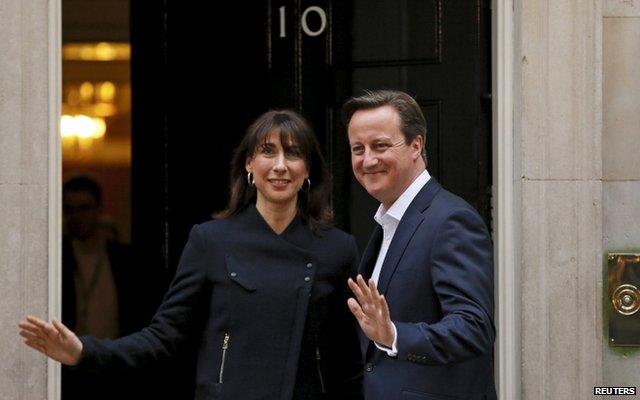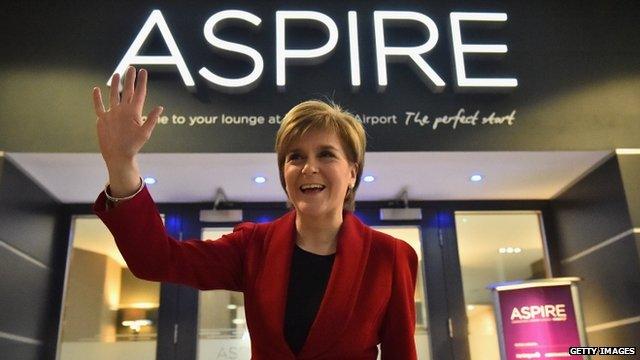Election 2015: What now for the future of the United Kingdom?
- Published

David Cameron and his wife Samantha returned to Downing Street following the Conservative Party win
David Cameron is back in Downing Street but at what price?
Has the Conservative prime minister sacrificed the union for another five years of power?
These are the questions many people are asking today after a party which fought for independence for 80 years swept to victory in Scotland.
The answer from the jubilant leader of the Scottish National Party, Nicola Sturgeon, is "no", this does not advance her cause.
She insisted that her MPs would speak for all of Scotland — not just for the 45% who voted for the country to leave the United Kingdom last September.
"This changes nothing," Ms Sturgeon told me when I asked her about independence at the count in Glasgow, in a brief moment of calm during the nationalist avalanche.
Of course she hopes that the real answer to the question "does this result herald the end of the union" is "not yet".
The Scottish Labour leader Jim Murphy has accused the Conservatives of fanning the flames of anti-Scottish sentiment and English nationalism over the past few months with a campaign painting a Labour government influenced by the SNP as a dangerous threat to Britain.
It worked. For now.
On a BBC debate on 8 April Ms Sturgeon said "something material would have to change" for her to propose another referendum on independence.
She remains clear that, for her, the only route to a second poll would be for the SNP to propose one in a Scottish Parliamentary election manifesto, then win a majority in that election and finally, of course, win the vote itself.
It is, she says, a "triple lock".
But what might that "material change" involve to start such a chain of events.

SNP leader Nicola Sturgeon flew to London from Edinburgh following her party's landslide victory
"Perhaps if the Tories wanted to drag us out of the European Union against our will, for example. That might change the circumstances," said the SNP leader in the debate.
That prospect is now one step closer.
In the meantime, the SNP will be arguing strongly for constitutional change.
Will the proposals in the Smith Commission for further devolution of powers to Edinburgh be enough to satisfy the new army of SNP MPs?
Or is this result a signal that Scottish voters want more radical reform, a change to the first-past-the-post voting system perhaps or even a complete restructuring of the UK along federal lines?
In the closing hours of the campaign, Ms Sturgeon turned to talk of "legitimacy."
That will be her watchword in the coming days as she argues that the prime minister cannot ignore the democratic will of the Scottish people.
Politically, Scotland and England now look and feel like very different countries.
If Mr Cameron wants the union to survive, he will have to dedicate a lot of energy to bringing them together again.